External links
- Attribution
![]() This article incorporates text from a publication now in the public domain : Lee, Sidney, ed. (1898). "Sterling, James". Dictionary of National Biography . Vol. 54. London: Smith, Elder & Co.
This article incorporates text from a publication now in the public domain : Lee, Sidney, ed. (1898). "Sterling, James". Dictionary of National Biography . Vol. 54. London: Smith, Elder & Co.
James Sterling | |
|---|---|
| Born | 1701 |
| Died | 1763 (aged 61–62) |
| Alma mater | Trinity College, Dublin (BA) |
| Notable work | The Rival Generals The Parricide |
James Sterling (1701 – 1763) was an Irish cleric and poet.
The son of James Sterling, he entered Trinity College, Dublin as a scholar in 1718, graduating B.A. in 1720 and M.A. in 1733. In that year he went to London with his friend Matthew Concanen. [1]
In November 1737 Sterling took a living in Anne Arundel County, Maryland. He was from 1739 the minister of the Episcopal St. Paul's Church near Chestertown. [2] [3] His ministry lasted to 1763, and saw the brick church doubled in size. [4]
Sterling travelled to London in 1752. He had associated in a scheme, with Benjamin Franklin who brought in backers from Philadelphia, to develop the North-West Passage. Franklin had become a sponsor of Captain Charles Swaine, who eventually made a Labrador Sea expedition in the Argo, in 1753. Sterling, however, struck out on his own, with a group of London merchants, and went to the Board of Trade for them, seeking exclusive rights to trade on the Labrador coast. Plans came to nothing, when the Board favoured the Hudson's Bay Company instead. [1] [5]
Sterling published: [1]
In 1724, Sterling made three contributions to Concanen's Poems, signed "J. S." [1]
Sterling married, firstly, Nancy Lyddell, who had acted in The Rival Generals in Dublin. In 1723, they went on to London, and Nancy made her stage debut there. She had died by 1733. In Maryland, he married in 1743 Rebecca Holt, widow of the Rev. Arthur Holt, and they had a daughter Rebecca, who married William Carmichael. He married as his third wife Mary Smith, in 1749. [2]
![]() This article incorporates text from a publication now in the public domain : Lee, Sidney, ed. (1898). "Sterling, James". Dictionary of National Biography . Vol. 54. London: Smith, Elder & Co.
This article incorporates text from a publication now in the public domain : Lee, Sidney, ed. (1898). "Sterling, James". Dictionary of National Biography . Vol. 54. London: Smith, Elder & Co.

Richard Luke Concanen, O.P. was an Irish prelate of the Roman Catholic Church, who served as the first bishop of the Diocese of New York from 1808 to 1810.
Bishop Robert Keith (1681–1757) was a Scottish Episcopal bishop and historian.
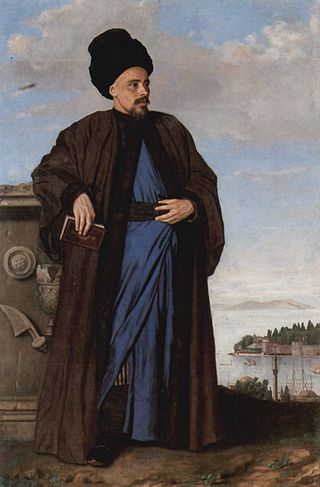
Richard Pococke was an English-born churchman, inveterate traveller and travel writer. He was the Bishop of Ossory (1756–65) and Meath (1765), both dioceses of the Church of Ireland. However, he is best known for his travel writings and diaries.
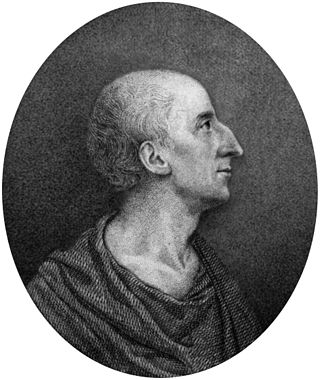
James Fordyce, DD, was a Scottish Presbyterian minister and poet. He is best known for his collection of sermons published in 1766 as Sermons for Young Women, popularly known as Fordyce's Sermons.
Isaac Maddox was an Anglican clergyman, successively bishop of St Asaph and of Worcester.

Arthur Dobbs was a British colonial official who served as the seventh governor of North Carolina from 1754 until 1764.
Capt. Darby Lux I (1695–1750) was a mariner, merchant, and Justice of Baltimore County, Maryland. The son of an English clergyman, was born in Kenton Parish, Devonshire, England, on June 15, 1695. He was christened on June 30, 1696, in Kenton. Darby immigrated in the early 1720s and settled in Anne Arundel County. He was a mariner by occupation from 1720–1742.

Sir Thomas Reeve, was a British justice.
Matthew Concanen was an Irish writer, poet and lawyer.
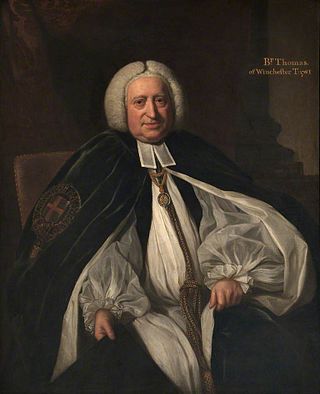
John Thomas was an English bishop.

Marcus Beresford, 1st Earl of Tyrone, known as Sir Marcus Beresford, 4th Baronet, until 1720 and subsequently as The Viscount Tyrone until 1746, was an Anglo-Irish peer and politician.

Robert Hunter was a portrait-painter and a native of Ulster. He studied under the elder Pope, and had a considerable practice in Dublin in the middle of the eighteenth century. He modelled his tone of colouring on the painting of old masters.
John Garnett (1707/08–1782) was an English bishop of Clogher in the Church of Ireland.
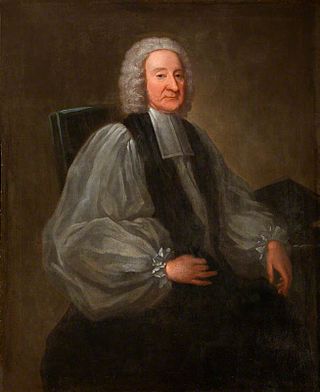
Charles Cobbe was Archbishop of Dublin from 1743 to 1765, and as such was Primate of Ireland.
Samuel Morton Savage (1721–1791) was an English nonconformist minister and dissenting tutor.
Henry Winder was an English nonconformist minister and chronologist.

James Fisher (1697–1775) was one of the founders of the Scottish Secession church. He was born at Barr, on 23 January 1697, the second son of Thomas Fisher, minister of Rhynd. He was educated at University of Glasgow. He was licensed by the Presbytery of Perth on 31 October 1722 and subsequently called and ordained on 23 December 1725. He dissented and joined with his father-in-law Ebenezer Erskine in his appeal and complaint to the Assembly of 1733. He was one of the four original members of the Associate Presbytery founded at Gairney Bridge on 6 December 1733. He was deposed by the General Assembly on 15 May 1740, but continued to preach in the parish church till 13 August 1741, when he was forcibly ejected on a sheriff's warrant. He then preached in a tent on Kinclaven brae during the time he remained in the district. On 8 October 1741 he became minister of Shuttle Street Associate Congregation, Glasgow. He was deposed by the Associate (Antiburgher) Synod on 4 August 1748 over the question of the Burgess Oath. He was appointed Professor of Divinity by the Associate (Burgher) Synod in 1749. He died on 28 September 1775.
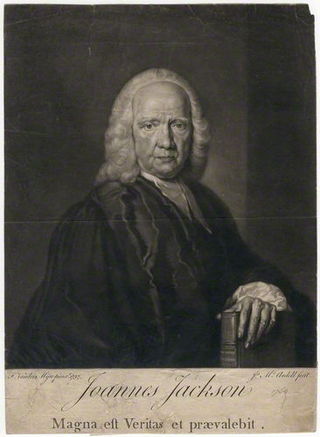
John Jackson (1686–1763) was an English clergyman and controversial theological writer.
Thomas Rundle (c.1688–1743) was an English cleric suspected of unorthodox views. He became Anglican bishop of Derry not long after a high-profile controversy had prevented his becoming bishop of Gloucester in 1733.
John Mason (1706–1763) was an English nonconformist minister and author.